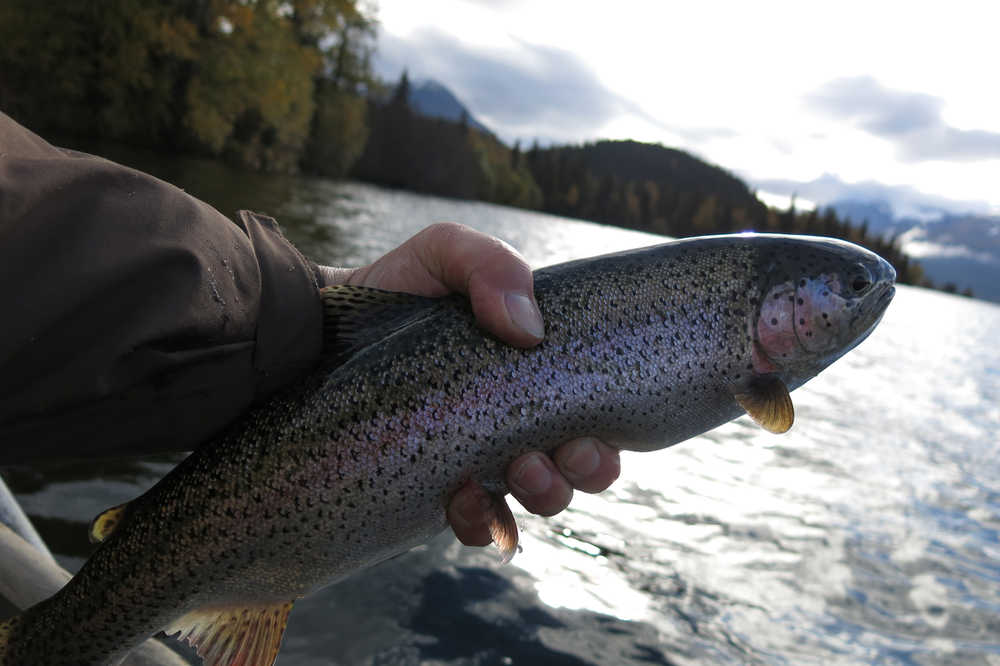It had been at least ten years since my last visit to the U.S. Forest Service’s cabin on Upper Russian Lake, so I figured it was time to set out once again and pay my respects. This venerable old cabin, constructed out of logs hand hewn by skilled craftsmen back in the 1950s, is one of my favorites and I was especially looking forward to visiting it again. I was also looking forward to fishing the lake as well as the upper reaches of the Russian River. Thankfully, this time I wouldn’t be breaking the law.
With all the trees recently blown down, it was a long trek from the end of Snug Harbor Road in Cooper Landing. The mountain bike ride through great stands of old growth timber was constantly interrupted by deadfall, the trail exceedingly wet and treacherous, and steeper than I’d remembered. How nice it would be, after a longer day than expected, to NOT have to pitch a tent. No, having reserved this cabin meant freedom of movement, time and the elbow room to sit leisurely around the stove and contemplate our surroundings. And in this particular cabin we would also be afforded the added pleasure of the nearby creek, its soothing accompaniment a constant and cordial companion. My partner, Cindy, and I would be experiencing all the joys of camping and each other’s company, without regard for the fickle disposition of the weather. And best of all, without fear of the law.
Unlike this recent visit, my first time at the cabin, back in the 1980s was early in the season. The trail was not yet free from the grip of winter, a few patches of dirty snow still clinging stingily to the ground amidst the standing water of “break-up.” It was the first year the newly cut trail from Seward, connecting the Resurrection River Trail with the Russian Lakes Trail, had been open, and a couple college chums and I, having come to Alaska to work in the canneries, were likely the first of the public to cross this new route. While there may have been very little green appearing trailside, my traveling partners and I were green as green can be. But despite being complete neophytes, kids from the East Coast, we were up for adventure, and in awe at every turn. We would stop constantly to marvel at a landscape vast and wild, and bordered in every direction by mountain peaks so striking and so completely foreign that their very existence, and our presence within their midst, seemed almost inconceivable.
It had been a couple of days of strenuous hiking both on and off trail. We’d seen our first moose and grizzly bears up close. We’d also unwittingly camped adjacent to one of their trails and heard the unnerving crunch of these beasts breaking through the brush unsettlingly close by, making for at least one night of very fitful sleep. After our third long day of hiking, nearing midnight and still light, with the weather beginning to take a turn for the worse, we reached Upper Russian Lake. With no idea that such things even existed, we were pleasantly surprised to find a cabin tucked along these pristine shores.
Certainly there is no excuse, there must have been a sign warning that the cabin was for use only by those possessing a valid permit. But with the logic and capriciousness of youth, we decided there was absolutely no reason a perfectly good cabin should stand empty. We did pitch our tents nearby just in case, ready to move if someone should show up in the middle of the night. But no one would, until late the next morning that is.
We wondered, as we fished from the boat that accompanied the cabin, catching rainbow trout that to us were by far the largest we had ever seen, who was circling in the floatplane. The weather had broken, and after having seen no one for days we paddled slowly, our glorious sun soaked mid-morning reverie suddenly over. Through an intense glare ricocheting off the placid waters of Russian Lake, it was difficult to make out just who had landed. But as we neared it became clear. Disembarking from the boat we stood before a forest ranger, accompanied by a trail crew and his trusty ticket book.
Despite pleading our ignorance, and offering to pay for the cabin rental, with no choice we gracefully accepted our fates — a $100 ticket each — a rather substantial fine for pre-season cannery hopefuls.
Unlike my last visit, this time reservations had been made well in advance. And approaching the cabin it was just as I had pictured it in my memory, a welcoming presence. The fishing was also as good or better than I remembered. We hit the river mouth dead drifting egg-patterns and in the lake stripped leeches. Having now fished this state for 30 years, the trout were not the largest I’d ever seen, but they were in every way magnificent, and held their own against any, especially on our 3-weight fly rods.
And, as evening fell, listening to the strains of the small creek filtering in through the open window, it was everything I had so nostalgically remembered from that first visit as well as subsequent others, almost like coming home.
Dave Atcheson’s latest book is “Dead Reckoning, Navigating a Life on the Last Frontier, Courting Tragedy on its High Seas.” He is also the author of the guidebook “Fishing Alaska’s Kenai Peninsula,” and National Geographic’s “Hidden Alaska, Bristol Bay and Beyond.” For more info: www.daveatcheson.com.
■ ■ ■
Tight Lines is published on the third Thursday of the month from October through April, and will return as a weekly feature in May.
Have a fishing photo to share or a tale to tell? Email news@peninsulaclarion.com.

